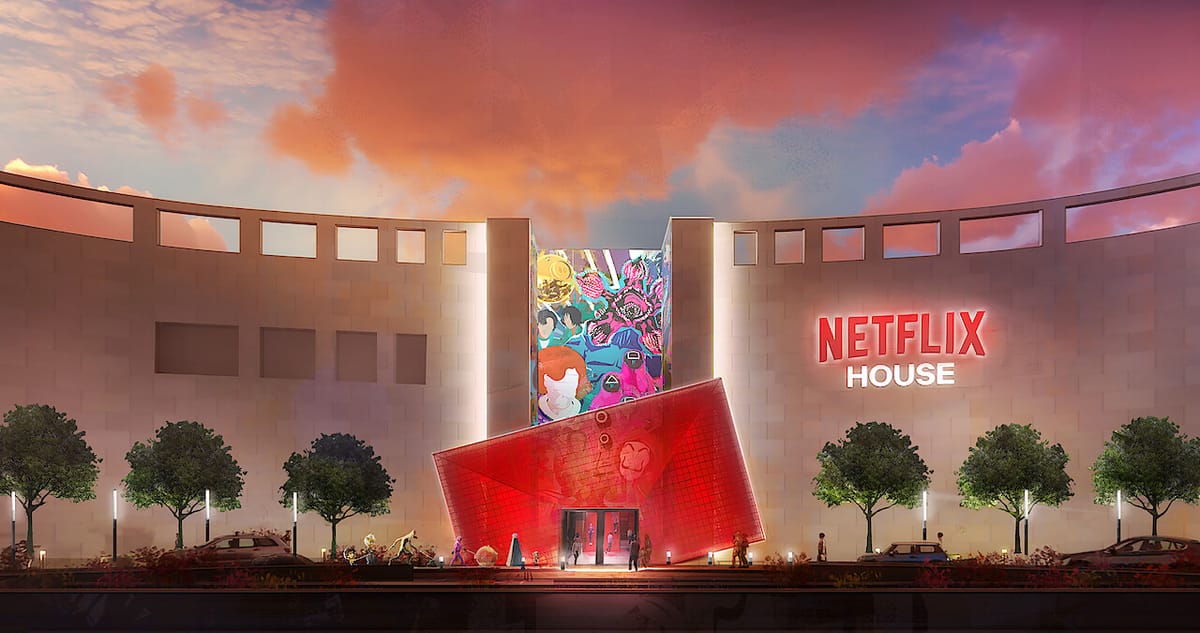Netflix's Risky Gamble: Why 'Netflix House' Could Be a House of Cards
Netflix announces its plan to venture into the physical retail space with "Netflix House"—a hybrid of a theme park and merchandise store set to debut in 2025.

In a plot twist that even the most imaginative screenwriters couldn't have conjured, streaming giant Netflix has announced plans to venture into the brick-and-mortar world.
The company that once disrupted the entire entertainment industry by keeping us glued to our screens is now betting big on getting us off the couch and into physical stores. But is this a stroke of genius or a desperate attempt to stay relevant in an increasingly competitive streaming landscape?
The "Netflix House" concept, set to debut in 2025, promises to be a theme park-lite experience that meets merchandise bonanza. Picture this: You walk into a store where you can buy a "Stranger Things" t-shirt, dine on dishes inspired by your favourite Netflix cooking shows, and perhaps even navigate a "Squid Game"-themed obstacle course (hopefully with less lethal consequences). It's an ambitious vision. But as we dive deeper into this strategy, some glaring issues come to light.
First, let's acknowledge the elephant in the room: Netflix is venturing into territory with little expertise. This company built its empire on algorithms and binge-watching, not managing physical spaces or creating immersive real-world experiences. The leap from streaming to retail is not just big; it's galactic.
Moreover, Netflix is late to a party that is already in full swing. Disney, the undisputed king of monetizing intellectual property, has been perfecting the art of theme parks and merchandise for decades. Universal Studios has a successful chain of theme parks and experiences.
Even Amazon, a fellow tech giant, has struggled to make a significant impact with its brick-and-mortar ventures despite its vast resources and data insights.
So why is Netflix making this move now? The answer likely lies in the company's recent challenges. The streaming market is more crowded than ever, with competitors like Disney+, HBO Max, and Amazon Prime nipping at Netflix's heels. The company has been forced to crack down on password sharing and tinker with its pricing models, moves that have been met with mixed reactions from subscribers. In this context, "Netflix House" looks less like a bold innovation and more like a Hail Mary pass.
But let's play devil's advocate for a moment. Could this work? There's no denying that Netflix has created some genuinely beloved properties. "Stranger Things," "Bridgerton," and "Squid Game" have all achieved cultural phenomenon status.
If Netflix can successfully translate the passion for these shows into real-world experiences, they might be onto something.
However, the success of "Netflix House" hinges on several factors that are far from guaranteed:
- Unlike Disney's timeless characters, many Netflix shows have a relatively short cultural shelf life. Will people still be excited about a "Tiger King" experience two years from now?
- Netflix's content is incredibly diverse, which is great for streaming but potentially problematic for a physical store. How do you create a cohesive experience that appeals to "The Crown" and "Big Mouth" fans?
- Creating compelling physical experiences is a different skill set from producing binge-worthy content. Netflix will need to hire top talent in this area or partner with experienced companies, both of which come with their own challenges.
- The costs of opening and maintaining physical locations are substantial. In an era where Netflix is already under pressure to control spending and boost profitability, this venture could significantly drain resources.
- In a post-pandemic world, are people clamouring for more reasons to leave their homes? The very convenience that made Netflix successful could work against this new venture.
It's also worth considering the potential negative impacts on Netflix's core business. If "Netflix House" fails to meet expectations, it could damage the brand's reputation and divert attention and resources from what Netflix does best: creating and streaming content.
Furthermore, this move raises questions about Netflix's long-term strategy and identity. Is the company still primarily a tech and entertainment company, or is it evolving into something else entirely? This identity crisis could confuse investors, partners, and consumers.
In the grand scheme of things, "Netflix House" feels like a solution in search of a problem. Netflix's challenges in the streaming market are real, but it's unclear how opening physical stores addresses these issues. Instead of doubling down on what made them successful – innovative content delivery and production – they're venturing into uncharted and potentially treacherous waters.
As we look towards 2025 and the debut of the first "Netflix House," it's hard not to be reminded of other ill-fated attempts by tech companies to break into physical retail. Remember Amazon's bookstores? Google's pop-up shops? These ventures are cautionary tales about the perils of straying too far from one's core competencies.
In conclusion, while it's admirable that Netflix is trying to innovate and find new revenue streams, "Netflix House" seems more likely to become a costly distraction than a game-changing success. The streaming giant would be better served by focusing on what it does best: creating compelling content and delivering it to viewers in the most convenient way possible.
As subscribers and industry observers, we should watch this development with a healthy dose of scepticism. After all, in the cutthroat world of entertainment, today's bold move can quickly become tomorrow's cautionary tale. Netflix has surprised us, but this time, they might write a check their experience can't cash.
Only time will tell if "Netflix House" will be a blockbuster hit or a box office bomb. But one thing's for certain: the streaming wars just got a lot more physical.




